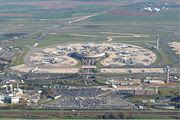You practically can’t open up an editorial page or blog without coming across some pundit scratching his head over John McCain “suddenly” going negative. Some wonder how John McCain had this horrible campaign thrust on him against his better nature and maverick spirit. Others express sorrow at seeing the man they once admired transformed into yet another victory-at-all-costs Republican willing to transfer from the Straight Talk Express to the Turd Blossom Special, as long as it stops at 1600 Pennsylvania Avenue along the way. Some, such as William Kristol, cry for the campaign to let McCain be McCain. Others, like a Time magazine doofus named Ana Marie Cox (who is well dissected here) wonder “wha happen?” to the guy they thought was so honorable and cool, and wait for him to be a maverick again. This article hits all the typical notes.
I am amazed that anyone who has spent even a moment studying the presidency and/or observing politicians could have such thoughts. It seems obvious to me that anybody running for the office of president is on some level a defective human being. To say to the world "I deserve more than anyone else to hold the most powerful political office in the world" requires an astounding degree of narcissism. Campaigning requires a comparable degree of mono-mania. I find this confirmed (at least in hindsight) by the performance of the people who actually reached the office. I can think of no examples of presidents since the U.S. became a major power who didn't exhibit some disturbing personality traits and who didn't commit at least some frightening abuses of their power (except perhaps those who died in office before they got to do anything).
Given this, I think it behooves journalists to work from the assumption that any serious candidate is in fact dishonest and dangerous, and that any image he presents of himself is to be questioned. Ultimately, it's a matter of the scale of the deceit and danger, not its presence or absence. On that continuum, as a human being, McCain is not Bush or Nixon, but he sure as hell ain't Jimmy Carter either (who was probably the closest we've ever come to having a president actually be what he professes to be).
In this light, it has been obvious from the get-go that the mainstream media has completely failed to report on John McCain as it should have. I mean come on, the man has actually called himself a maverick for years, without winking. In and of itself that should be a clue that he's trying to mask his conformity. Real mavericks don't call attention to their differences. They just keep doing whatever they do, and to hell with everyone else's opinions. Gandhi was a maverick. Oskar Schindler was a maverick. Ted Kazcynski was a maverick. William S. Burroughs was a maverick. John McCain is about as much of a maverick as the Fonz.
Throughout McCain's career, there have been well established (but under-reported) instances of the gaps between what he says about his character and values and his actual behavior, in both his personal and public lives. His treatment of his first wife. His behavior in the Keating five scandal. His notorious ill-treatment of people in his inner circle and foul temper. His less than complete grasp of most of the facts and issues he confronts. His campaign finance practices. His earmarks and log-rolls. He's not the worst hypocrite ever. He actually has on occasion gone with his conscience in spite of his self or party interest. However, this has been nothing like the matter of course that so many are convinced it is.
Maybe at least in this small way he is better than the most craven of his peers. But, realistically, he does not stand apart from them. He is one of them, in spirit and action.
Actually, I take that back. He is in at least one dimension worse than any of his peers that I can think of. He is the only current member of congress to have spent years in captivity as a prisoner of war under horrible conditions and frequent torture. He knows better than any of his peers how terrible it is for those in Camp X-Ray, or the ratholes of extraordinary rendition. He also knows the galvanizing effect torture, (and endurance), have on soldiers who believe in their cause. Yet when presented with an opportunity to take a stand against the Bush/Cheney torture regime, he did so only briefly. He then turned about face to legislate a policy that specifically allowed heinous torture of POW's and others in the Bush/Cheney Gulag, in an obvious quid pro quo for support of his presidential bid.
So if all serious presidential aspirants are to be treated as sociopaths, what are we to make of Barack Obama? The worst anyone seems to be able to dredge up against him is that he maintained personal ties to an impolitic preacher and an erstwhile Weatherman. He seems to be the apotheosis of decency and sophistication. Annointed "the one" by the Matrix generation, he is seen as a morally pure, prophetic liberator from the yoke of Republican tyranny. Yet here he is, on the threshold of the presidency, so there must be something, or else the defective human being theory of political success must be abandoned.
Hmm. What could it be? Among friends, I have joked that I have profound reservations over Obama's honesty because of his confessions in his first memoir that he was a dope fiend in his college days. I have my doubts. He was class of '83 at Columbia. I was class of '84. I lived in Sigma Nu for a semester. I played in bands. Barry who? I never saw the guy once. Not at the pot store on Amsterdam Ave, not in the back room at Cannon's, not at tequila night at the West End. Not drinking the Quaalude and grain alcohol punch at the parties in Furnald Hall. If he can lie about being a degenerate, what else is he lying about?
But seriously, a recent event makes it clear that the DHBTPS is safe for another election cycle. On October 20, Colin Powell endorsed Barack Obama. Wow, you say. The leading African American Republican switches sides for our guy. That's terrific. Cynically, yes, it probably is terrific, if endorsements mean anything. And how did Obama respond? He called him "a great soldier, a great statesman, and a great American." He then went on to say: "I have been honored to have the benefit of his wisdom and counsel from time to time over the last few years, but today, I am beyond honored and deeply humbled to have the support of General Colin Powell." Wow, you say, what a gracious acceptance, standing on the shoulders of giants and all that. Again, cynically, nice touch, Barry.
But wait a second, what's Obama's position on the war in Iraq? Right, he was against it in 2003, and has been ever since. He says it's one of the worst mistakes in the history of U.S. foreign policy and has had dreadful consequences at home and abroad. And what does he think of his colleagues who support the war? He says the biggest thing wrong with John McCain is his judgement about the war. It completely overshadows whatever positives there are in the rest of his resume. And remind me again, who was it who actually made the public case for the war in Iraq, turned American opinion in favor of it, and crafted the "coalition of the willing" by telling a bunch of lies and half truths to the United Nations? Right, Colin Powell. And when did Colin Powell express regret for having done this and come out in favor of withdrawing U.S. troops from Iraq ASAP? Uh, not yet. In fact, as near as I can tell from his recent utterances, he still supports the war and thinks the surge was terrific.
Yet Obama welcomes the support and advice of this man whom I doubt he really respects. I can only guess why, but I think it is because he has made a calculation that the American public is blind to what Powell really is (a consummate Pentagon bureaucrat, with a mixed command record, and a disastrous civilian one), and is still drawn to his personal magnetism and prominence. If Obama really had the courage of his convictions, he would reject the endorsement and tell the American public what fools they have been for allowing themselves to be duped again and again by this fraud. The reality, though, is that he wants to be elected more than he wants to be right. In accepting Powell's endorsement and saying nothing about Powell's role in getting us to where we are now in Iraq, he allows Powell once again to abuse his status as a touchstone for black pride and white guilt. In effect, he absolves and endorses Powell in a cynical bid for the votes that he thinks this might bring him.
This is not the worst thing a politician could do, but is undoubtedly something a politician would do. I often joke that no man alive deserves to be president, therefore I'm voting for a dead guy, Eugene V. Debs. I thought I might have to shelve that line this year, but it looks like old Eugene is on the ballot again. Now if I can only figure out how to do a write-in ...













